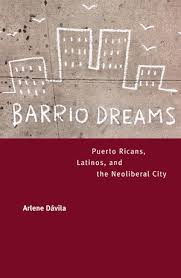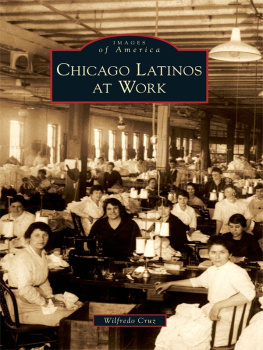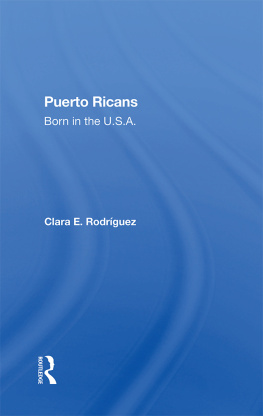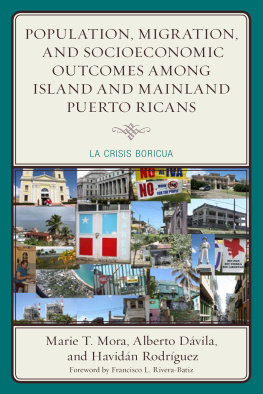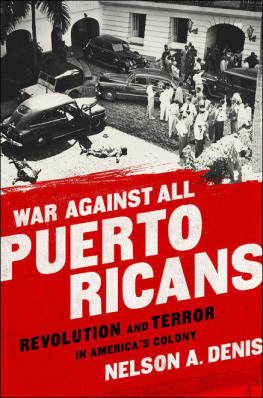Arlene Dávila - Barrio Dreams: Puerto Ricans, Latinos, and the Neoliberal City
Here you can read online Arlene Dávila - Barrio Dreams: Puerto Ricans, Latinos, and the Neoliberal City full text of the book (entire story) in english for free. Download pdf and epub, get meaning, cover and reviews about this ebook. year: 2004, publisher: University of California Press, genre: Politics. Description of the work, (preface) as well as reviews are available. Best literature library LitArk.com created for fans of good reading and offers a wide selection of genres:
Romance novel
Science fiction
Adventure
Detective
Science
History
Home and family
Prose
Art
Politics
Computer
Non-fiction
Religion
Business
Children
Humor
Choose a favorite category and find really read worthwhile books. Enjoy immersion in the world of imagination, feel the emotions of the characters or learn something new for yourself, make an fascinating discovery.
- Book:Barrio Dreams: Puerto Ricans, Latinos, and the Neoliberal City
- Author:
- Publisher:University of California Press
- Genre:
- Year:2004
- Rating:4 / 5
- Favourites:Add to favourites
- Your mark:
- 80
- 1
- 2
- 3
- 4
- 5
Barrio Dreams: Puerto Ricans, Latinos, and the Neoliberal City: summary, description and annotation
We offer to read an annotation, description, summary or preface (depends on what the author of the book "Barrio Dreams: Puerto Ricans, Latinos, and the Neoliberal City" wrote himself). If you haven't found the necessary information about the book — write in the comments, we will try to find it.
Arlene Dávila: author's other books
Who wrote Barrio Dreams: Puerto Ricans, Latinos, and the Neoliberal City? Find out the surname, the name of the author of the book and a list of all author's works by series.
Barrio Dreams: Puerto Ricans, Latinos, and the Neoliberal City — read online for free the complete book (whole text) full work
Below is the text of the book, divided by pages. System saving the place of the last page read, allows you to conveniently read the book "Barrio Dreams: Puerto Ricans, Latinos, and the Neoliberal City" online for free, without having to search again every time where you left off. Put a bookmark, and you can go to the page where you finished reading at any time.
Font size:
Interval:
Bookmark:

Map of East Harlem. Insert shows its location in Upper Manhattan.
Barrio Dreams
PUERTO RICANS, LATINOS,
AND THE NEOLIBERAL CITY
ARLENE DVILA
UNIVERSITY OF CALIFORNIA PRESS
Berkeley Los Angeles London
University of California Press
Berkeley and Los Angeles, California
University of California Press, Ltd.
London, England
2004 by the Regents of the University of California
Library of Congress Control Number:
2003064572
Manufactured in the United States of America
13 12 11 10 09 08 07 06 05 04
10 9 8 7 6 5 4 3 2 1
The paper used in this publication meets the minimum requirements of
ANSI/NISO Z39.481992 (R 1997) (Permanence of Paper).
Contents
Illustrations
In memory of Delmos Jones
Acknowledgments
Books solidify things. It's unavoidable. El Barrio/East Harlem is happening as we speak in many more ways than I can describe in this text. Yet I take the risk: this book is about a moment that I feel speaks about this community's past and its future. As I write the customary acknowledgments, the difficult predicament is not who, but who not to thank and acknowledge. This project benefited from the help, time, enthusiasm, and comments of many residents of East Harlem/El Barrio, including activists, artists, colleagues, and friends, in and beyond its physical and imaginary boundaries, who are too numerous to list. But the help of some individuals was particularly indulgent. I could not but try to thank some of them here, even if this would necessarily fall short from acknowledging the extent of their many contributions to this project. Such is the case with Debbie Quiones, Erica Gonzlez, Melissa Mark Viverito, Ismael Nunez, and Rolando Corts, whose support was continuous and insurmountable throughout the development of this book. To Debbie, my first contact about community politics and the community board, I am particularly indebted and thankful for her vision, insight, and trust. Thanks also are due to John Rivera and Jos Rivera, Fernando Salicrup, Yolanda Snchez, Juan Cceres, Erika Vilkfort, Jerry Domnguez, and Aurora Flores, for their continuous assistance, and most important to East Harlem's Community Board 11. Thomas Lunke, Dorothy Dsir-Davis, Javier Llano, and Norma Ojeda were extremely helpful in regard to particular policies, meetings, and for providing valuable contacts. I thank other residents and community activists for their time and their spirit, most of whom are identified by name in these pageswith the exception of those I was unable to contact for permission to use their names.
Many other people contributed in more ways that I can describe. I'm enormously thankful to my friends and colleagues Maureen O'Dougherty, Gabriel Haslip-Viera, Jocelyn Sols, Elizabeth Chin, Ed Morales, and Yasmn Ramrez for providing important feedback and for teaching me so much in the process. Discussions with Juan Flores and artists Juan Snchez and Digenes Ballesterfrom whom I first heard warnings about processes of gentrification in the area in the early 1990swere also pivotal throughout the years I undertook this project.
Evelina Dagnino's call for More cultural politics!, as well as fruitful conversations on cultural hemispheres and cultural agency and cities and translocal flows, where I had the pleasure of meeting exciting colleagues from the Americas and sharing some of this work, were also enormously inspiring. Thanks to the vision and organizational skills of Marcial Godoy, Rosanna Reguillo, Ramn Gutirrez, David Theo Goldberg, and Doris Sommer.
Acknowledgments are also due to Julie Sze, who served as research assistant. Segments of this work were also commented on by Felipe Pimentel, Richard Handler, Alyshia Galvez, Sandra Ruiz, Fred Myers, and Ral Homero-Villa. I am particularly grateful to Monique Taylor, Hector Cordero Guzmn, Steven Gregory, and Lus Aponte-Pars, who generously reviewed the manuscript for the Press. Hector's know-how about important policy and statistical data and discussions with Steven Gregory about barrio politics were extremely helpful. Lus's careful consideration of the politics of space have been an inspiration to many scholars. This work follows his productive footprints.
Lastly, I'm always grateful to my colleagues and students at New York University's American Studies and Anthropology Department for their constant inspiration. I especially benefited from the comments made by Lilcia Fiol Mata, Robin Kelley, Lisa Duggan, and Tricia Rose during a presentation at a faculty seminar, where I presented the earliest version of this work. The feeling of being part of a larger intellectual project was extremely inspirational. My appreciation also goes to my new colleague, Adam Green, who graciously and usefully provided instant feedback during the last stages of publishing this book. Thanks also to Sandra Ruz and Jan Padios, who provided invaluable proofreading assistance. Comments from students, colleagues, and audience members during presentations at Rutgers University (Laurie Ouellette), University of Florida, Gainesville (Efran Barradas and Tace Hedrick), and Columbia University (Steven Gregory) were also extremely invigorating as I sorted through the myriad issues this work sought to tackle. I am also indebted to Mariano Desmars, whose passion for the aesthetics and materiality of space was an inspiration and fundamental to the development of this project. A grant by New York University's Humanities Council facilitated final preparations of the book. Finally, it was a pleasure to have had the opportunity to work again with the editorial team of the University of California Press. My greatest appreciation goes to Naomi Schneider, for her insight and continuous support. The care and professionalism of Sierra Filucci and Nicole Hayward and Kate Warne were unparalleled.
Introduction
BARRIO BUSINESS,
BARRIO DREAMS
This is not an antipoverty program, repeated New York City congressman Charles Rangel to a beleaguered audience of East Harlemites, mostly Black and Puerto Rican, in an informational forum on Empowerment Zone (EZ) legislation. Once again, the initiative he himself had helped design to revitalize distressed inner-city communities through economic investment and incentives was the subject of much reproach and criticism. In particular, East Harlem Latinos felt that they and their community had been neglected by the initiative. But Rangel was adamant: This is not about your dreams. This is about business, profit, and jobs. Only projects that prove to be profitable and entrepreneurial would be considered for funding. But he was speaking at the Julia de Burgos Latino Cultural Center in March 2002, itself the product of previous struggles, not to mention state distribution programs to quench political claims. The audience could still remember a time when cultural demands commanded economic resources and political valence. But there was little that could be done. Coffee and biscuits had been served, the meeting was called back to order, and break-out sessions were about to start. Some sat anxiously through the forum while others swiftly departed in protest.
One of the central contradictions in East Harlem is the treatment of culture as industry to attract jobs, business, and profits and the simultaneous disavowal of ethnicity and race as grounds for equity and representation. Meanwhile ethnicity and race are in fact the bases on which urban spatial transformations are being advanced and contested. The resulting struggles around space, representation, and identity not only reveal strategies of contemporary Latino cultural politics but also the place of culture in the structuring of space.
Next pageFont size:
Interval:
Bookmark:
Similar books «Barrio Dreams: Puerto Ricans, Latinos, and the Neoliberal City»
Look at similar books to Barrio Dreams: Puerto Ricans, Latinos, and the Neoliberal City. We have selected literature similar in name and meaning in the hope of providing readers with more options to find new, interesting, not yet read works.
Discussion, reviews of the book Barrio Dreams: Puerto Ricans, Latinos, and the Neoliberal City and just readers' own opinions. Leave your comments, write what you think about the work, its meaning or the main characters. Specify what exactly you liked and what you didn't like, and why you think so.

